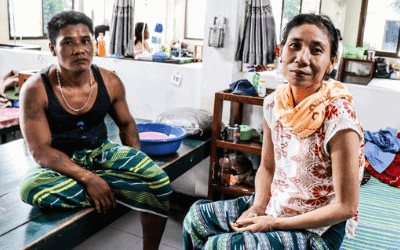Refugee health clinic key to migrant worker health
 From makeshift clinic to comprehensive community health centre
From makeshift clinic to comprehensive community health centre
In February 1989, five months after fleeing a brutal military crackdown in Myanmar, Dr Cynthia Maung and a small group of students opened a makeshift medical clinic on the outskirts of Mae Sot, Thailand. The clinic had few supplies, no money, and no formally trained medical staff (except for Dr Cynthia). Other factors compounded their problems; they were in Thailand illegally and didn’t speak the language.
Over the years, the Mae Tao Clinic (MTC) has grown into a comprehensive community health centre providing essential health care and medical services to migrant worker communities along the Thai-Myanmar border. MTC has also become a hub for regional health training with more than 3,000 graduates serving clinics, schools, villages, factories, camps and peri-urban slums along both sides of the border.
The clinic has an annual caseload of over 100,000 patients (300-420 each day) with over 2,000 babies being delivered. Around half of the patients are from the local migrant community, with the rest travelling from communities inside Myanmar. The clinic’s health services have to cope with both acute and chronic medical problems. MTC works with organisations like Burma Children Medical Fund (BCMF) to ensure that more serious cases unable to be treated on the border, are referred to hospitals in Chiang Mai for treatment. In addition, and with collaboration from 8 other ethnic health organisations, MTC provides services to remote and isolated areas in eastern Myanmar. In some remote areas, the clinic’s former students have become the only sources of medical care.
Union Aid Abroad – APHEDA has been supporting MTC since 1996.
Building cross-border partnerships and support for a stronger health system in Eastern Myanmar
Together with partner health organisations, MTC recently developed a standardised referral form to be used on both sides of the Thailand-Myanmar border. This standardised form and associated standardised referral protocol have led to the Mae Tao Clinic being able to more efficiently receive and refer cross-border referrals. MTC has begun referring HIV-positive patients for enrolment in the Myanmar National Health System at Myawaddy Hospital, Myanmar. Throughout 2017 MTC’s health team has gradually referred more types of patients allowing some patients to be treated in Myanmar for non-emergency obstetric care, chronic diseases (e.g. diabetes and hypertension) and prevention of mother to child transmission of HIV.
Mae Tao Clinic always seeks opportunities to engage in new partnerships and to advocate for the strengthening of healthcare services along the border and in Eastern Myanmar. As part of this advocacy, over the last 12 months, MTC has met with representatives from the Thai Ministry of Public Health and the Myanmar Ministry of Health and Sports (MoHS). Topics of discussion included maternal child health training and the content of the MoHS Essential Package of Health Services. The MTC team visited Myawaddy Hospital over the border in Myanmar on a number of occasions to advocate for cooperation on cross-border referrals and to jointly organise World AIDS Day activities.
MTC will continue working towards building strong relationships with hospitals and clinics in Eastern Myanmar to assist with the development and strengthening of health care systems in the region.
Advancing and aligning Maternal and Child Health with Myanmar’s National Health Plan
Mae Tao Clinic plans to actively pursue the potential of aligning its Maternal and Child Health (MCH) and Emergency Obstetric Care (EmOC) training programmes and standardised clinical competencies with those required by the Myanmar National Health Plan 2017-2021. The goal is to harmonise the level and capacity of regional and ethnic health workers with Myanmar government health workers. This includes regional and ethnic health workers being registered and accredited with official health worker training institutions in Myanmar. MTC and Ethnic Health Organisation (EHO) health workers will be given clinical internship opportunities and ongoing medical education for their knowledge and skill sets to remain up to date.
Mae Tao Clinic will also advocate to become recognised as a learning and clinical performance improvement centre for ethnic health workers. MTC is committed to strengthening ethnic training centres in eastern Myanmar and gradually handing over some training to these centres. Read Mae Tao Clinic Strategic Plan 2017-2021
Become a member today and contribute to Union Aid Abroad – APHEDA’s work in Myanmar and our other projects. Yes, sign me up!
More information:
- Mae Tao Clinic website
- Fragile Sanctuary, SMH, August 2013
- Foreign policy cuts funding for AusAID-funded refugee clinic, DevEx, Nov 2013
- The Miracle Clinic, ViceNews, 2018
- Mae Tao Clinic to persist despite funding cuts, Karen News, Dec 2017
- Our Work: The Mae Tao Clinic, Union Aid Abroad – APHEDA, April 2016
